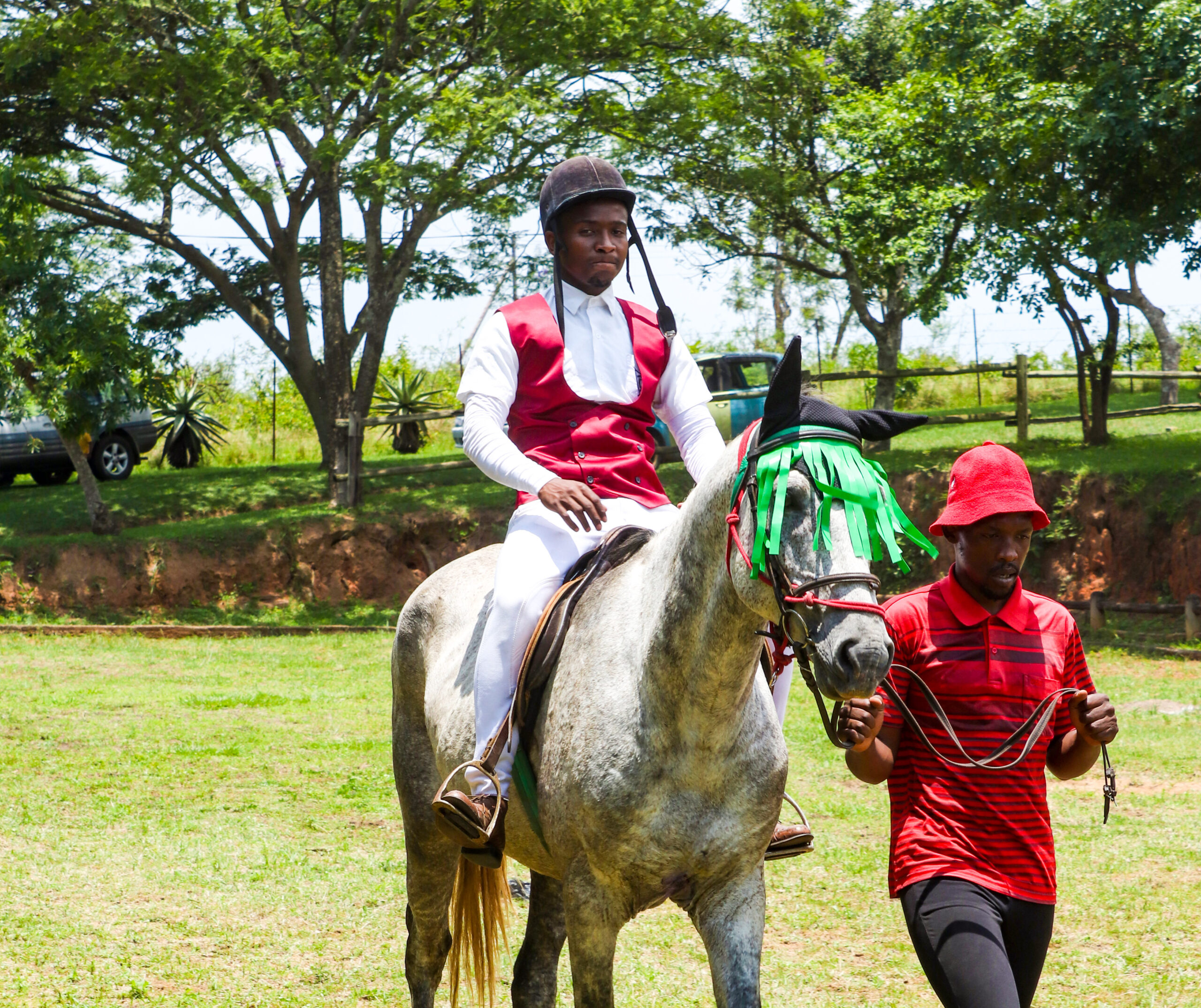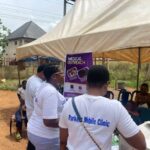Nokukhanya Musi – Aimienoho,
Bandile Baartjies talks about how his passion for horsemanship began at six, at his grandmother’s place in Mkhulamini, in the Manzini region of central Eswatini. There, an uncle maintained horses and other farm animals and the young Baartjies was afforded the opportunity to get to know them – and to become familiar with equestrian pursuits.
“That is where and how the journey began. As I grew older, I wanted to create a space where people of all ages and backgrounds can come to learn more about horses,” he explained.
Now at the age of 28, Baartjies has established Baartjies and Sons Equestrian Club and Permaculture Institute, where he teaches horseriding to people from communities around Manzini, while simultaneously advancing the concept of permaculture.
Baartjies faced a lot of scepticism and resistance from his community when he first started teaching horseriding skills. Some even called him crazy for attempting to teach horse riding to people with limited resources.
Regardless of the challenges, however, Baartjies was determined to prove that anyone could learn to ride a horse, no matter their background.
“I saw a gap in the equestrian world, particularly those from low-income families, who did not have any access to horse riding facilities or any proper professional instruction and learning about the principles of permaculture. I wanted to start and own a safe and welcoming practical skills development centre accommodating people from all walks of life especially where children could grow, learn together and where everyone could feel a sense of belonging. That’s one of the other main reasons for establishing Baartjies and Sons Equestrian Club and Permaculture Institute,” he said.
At his institute, lessons on horse riding and horse management training are offered to both children and adults and are held throughout the week and by special special appointments on weekends.
“A 30-minute horse riding lesson including grooming lessons goes at 150 lilangeni (about US$8) while an hour session goes for 300 lilangeni (about US$16). If we take the horses to a school it’s 50 lilangeni (about US$2.69) per child which covers fuel costs and the horsebox for transportation of the horses. To hire a horse for private functions or kids’ birthday parties is 2000 lilangeni (about US$107) for one horse and 5000 lilangeni (about US$269) for weddings,” Baartjies disclosed.
Losing his father at the age of 12 and experiencing a difficult childhood is what Baartjies credits for his sense of identity with the downtrodden in society. It also led to the youngster volunteering at local organisations, a time when he first started thinking about the concept of introducing horseriding to rural developing communities.
“Before establishing the Baartjies and Sons Equestrian Club and Permaculture Institute in 2014, I spent many years volunteering at other equestrian clubs and permaculture institutes,” Baartjies shared.
Through volunteering, Baartjies also met a mentor, Allan Brown, in 2012. Brown recalled that when he first met Baartjies, the young man had just finished final exams during the last year of secondary school.
“I was walking around the boundary of my farm, and this young kid whistled at me, and there was Bandile. He introduced himself and informed me that he had just finished matric and he saw that I had horses and announced that he would like to learn how to ride and work with horses. He proceeded to lay out the vision for his life. One thing that struck me at the time was that he was a very well-spoken young man, confident, knew what he wanted and had a vision,” Brown said.
According to Brown, Baartjies was seeking experience from him and not work.
“He wasn’t coming to ask for employment. He wanted to volunteer and all he wanted in return was to have the experience of working with animals,” he explained.
Baartjies spent several years working with Brown, who taught him everything he needed to know about training and caring for horses.
Thereafter, Baartjies set out to realise his dream of setting up his own facility where he could impart the same knowledge to people within his community.
He started by making a collection of all the things he knew he would need to start by buying new and used horse-riding equipment.
“Some other expensive horse equipment was sourced through donations and collected for me by my mentor at Dee’s Saddlery Tack Shop in Fourways in Johannesburg and from some of his other fellow horse riding instructors and equestrian friends…” Baartjies shared.
Baartjies also now offers free horseriding and grooming lessons for less well-off youths.
“It’s a marketing strategy to get more children involved in the program and to raise awareness because most of them are dropout kids, ex-cons, some are very poor and some are from child-headed families,” he said.
Nelly Tsabedze enrolled her nine-year-old son Lethokuhle Mokoena at Baartjies’ school this year. She sought out Baartjies’ lessons because she felt her son – who is without a father figure present – needed a mentor and because he showed an interest in horses. She wanted to support that interest.
“I have seen major improvement in my son’s performance compared to when he first started. He is now more responsible and he has now overcome his fear for horses,” Tsabedze said.
Tsabedze further noted that there are certain perceptions and narratives that exist in her community towards Black children and horseriding.
“Black parents still do not consider horse riding as a sport that their children can partake in. I believe parents should allow their kids to try this sport. My son has taken to the sport so much that he would also like to teach other kids how to ride horses,” she said.
12-year-old Mlamuli Nkambule’s mother Nonhlanhla Nkambule agreed with Tsabedze about the perceptions regarding horse riding but observed that there is a growing movement to change the narrative and to make horse riding more accessible to all children, regardless of their background.
“It is important to break down these barriers and to give all children the opportunity to experience the joy and benefits of horse riding,” she said.
Nkambule’s son began taking riding lessons in 2017 and has since learnt all there is to horsemanship and other valuable lessons in caring for a horse.
“He has learnt valuable life skills every child should learn. Although horse riding can be quite challenging, as the children master new skills they gain a sense of accomplishment and pride,” Nkambule added.
Manzini community elder Gcwalisa Dlamini lauded Baartjies for his efforts to provide the rural youth in the community with other skills by introducing them to the world of horse riding.
“He has opened up a new world for our youth that has given them hope and they are inspired by his story of a young man who has risen against adversity to create a meaningful future not just for himself but also for those around him,” he said.
Baartjies admits that one of the biggest challenges has been the fact that some people in the community don’t understand the benefits of horse riding.
“I’ve been working hard to educate the community about the benefits. I’ve held workshops and events to raise awareness, and I have also been collaborating with local schools to introduce horse riding into the curriculum. There has been some progress but it is a slow process in the rural developing communities and some orphanage care points. We need more resources and horses to expand to accommodate as much as we can. With the right attitude, focus and determination to work smart, anything is possible,” he said.
“This can inspire others to get involved and make a difference in their own communities.”
bird story agency
Bandile Baartjies’ journey with horses began at his grandmother’s farm in Mkhulamini, Eswatini. His passion led him to establish Baartjies and Sons Equestrian Club and Permaculture Institute to teach horseriding and permaculture, despite skepticism from the community. The institute offers lessons to both children and adults, with fees ranging from 150 to 5000 lilangeni depending on the service.
Baartjies’ challenging childhood and volunteer work with mentor Allan Brown shaped his vision. He sourced horse equipment through purchases and donations to start his club in 2014. His initiative offers free lessons to disadvantaged youth, aiming to break societal barriers around horse riding. Parents like Nelly Tsabedze and Nonhlanhla Nkambule endorse the positive impact on their children.
Despite community resistance, Baartjies continues to educate about the benefits of horseriding through workshops, collaborations with schools, and community events. His efforts are changing perceptions and providing rural youth with valuable skills and hope. Baartjies believes in the potential for positive community impact with the right resources and determination.
bird story agency






